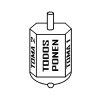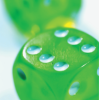Search Results
Showing results 21 to 37 of 37
Pattern Sticks
Source Institutions
In this activity, learners compete to be the first to win twenty counting pieces. First, learners draw patterns on only one side of four craft sticks.

Is it a Fair Game?
Source Institutions
In this math activity, learners play two versions of a card game and decide what makes a game fair. Learners also practice addition and subtraction skills.

Toma Todo
Source Institutions
In this activity, learners play a traditional Mexican game of chance with a twist. Learners take turns spinning a special "Toma Todo" top.
Pom-Pom Probability
Source Institutions
In this math activity, learners predict how many pom-poms they can toss inside a circle from three feet away. Use this activity to help learners explore probability.

When Pigs Fly
Source Institutions
In this math lesson, learners explore probability.

Stairway to the Sky
Source Institutions
In this math activity, learners use cubes to calculate how many blocks it would take to build stairways with different heights.
Odd or Even
Source Institutions
In this math activity, learners play a game and try to collect the most cards by guessing if the next number to appear will be odd or even.

Achi: A Strange Game of Tic Tac Toe
Source Institutions
In this game, learners strategize to be the first player to make three in a row.

Race to the Top
Source Institutions
In this math game (Page 6 of the Are You Game? PDF), learners examine the probability of rolling sums from 0 to 12 with two dice. The first player to reach the finish line is the winner.
Pass or Roll!
Source Institutions
In this math activity, learners play a game in which every roll can earn you counters, but if you roll the wrong number (6), you have to put everything back.

Creating Tostadas
Source Institutions
In this activity, learners develop their understanding of combinations as they create as many different kinds of tostadas as possible.
Spin to Win!
Source Institutions
In this math activity, learners play a probability game and try to be the first to get to the end of the game board path .This activity guide contains a material list, black line masters for the game

Probability
Source Institutions
In this activity, learners will explore probability using dice. They will predict and then roll the dice to observe how many rolls it would take to repeat a matching pair. Learn track predictions vs.

Building an Army
Source Institutions
In this activity, learners explore the potential of interchangeable standard parts to create a large number of unique creations in different combinations.

Toss a Score!
Source Institutions
In this math game, learners toss plastic cups to land just right and collect points to win.

Fair Spinners
Source Institutions
In this math game (Page 9 of the Are You Game? PDF), learners determine what makes a spinner fair or unfair. Learners first play a round with a pre-made spinner that isn't very fair.

Bank It!
Source Institutions
This simple but open-ended math game introduces basic probability concepts using coins and dice. Players roll the dice and collect coins to match the number rolled.
